
| Tis the Election Season | |
| by Peter Rice '05 Photos by Tom Kimmell |
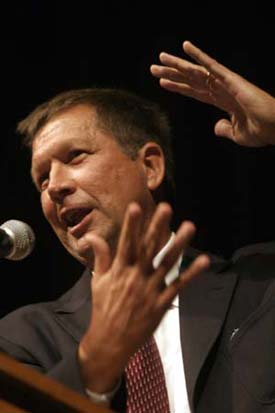 |
| Former Ohio Congressman John Kasich told a crowd in Armstrong Hall to stick to their principles: “When you believe in something, and it’s something that has the moral high ground — no matter what they say to you, you keep at it. You don’t give up. |
| Photo by Tom Kimmell |
This presidential election season, Colorado College stepped back from the chaotic mass of sound bites, campaign promises, and baby-kissing to take a broad look at the presidency, the impending election, and the future of America — with help from prominent visiting lecturers and CC student debaters.
Speakers at autumn events of the Fred A. Sondermann Symposium on the Presidency didn’t claim to have developed the superpowers needed to call the election for President Bush or Senator Kerry, but they agreed that the winner will deal with an America more partisan than ever.
“We’ve all lined up in our own uniforms,” former Ohio Congressman John Kasich told a packed Armstrong Hall. The maverick Republican made a name for himself by doing just the opposite: working with Democrats on key legislation. But those days are past, he says: “When this election is over… you’re going to have gridlock.”
The point was echoed by Norman Ornstein, resident scholar at the American Enterprise Institute. “Whichever side loses this election will be bitter and vindictive,” he said. “Governing over the next few years is going to be really awful.”
At the same time, tough issues are sneaking up on the country — especially the complex problems surrounding the costs of Social Security and health care. “The geezer boom is meeting the baby boom,” Ornstein quipped.
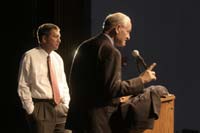 |
The CC debate team dramatized political divisions in the country. Saying the economy was stronger and the recession was all but a memory thanks to President Bush’s direction, Brian Boyle ’06 argued in favor of re-election. “He’s a man of character and integrity upon whom we can depend,” Boyle said.
The opposition team begged to differ. “Let’s talk about a $500 billion deficit — a deficit that future generations are going to have to pay off,” countered Caitlyn Ross ’05. “Let’s give Senator Kerry the opportunity to fix the situation.”
 |
| “Norman Ornstein forecasted an election campaign full of surprises: “Anyone who tells you what is going to happen is making it up.” |
Not only is the contest highly contentious, but everything is more complicated thanks to new campaign strategies, voter registration drives, and problems with polling in a modern era, said Susan Estrich, a television commentator, law professor, and campaign manager for 1988 presidential candidate Michael Dukakis.
Estrich said President Bush was ignoring swing voters in favor of going after four million evangelical Christians who didn’t vote in the last presidential election. An interesting strategy, Estrich said, but one that hasn’t been tried before.
At the same time, new voters registered all over the place, but no one is quite sure where they stand — or
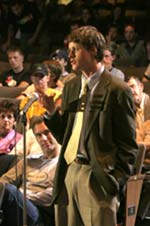 |
Even polling isn’t as accurate as it could be, Estrich added, because more and more people are abandoning ground phone lines in favor of mobile phones, which don’t show up on pollsters’ lists. And then there’s the human element: “Here’s the problem: a lot of people lie. I know this will come as a surprise,” Estrich quipped.
National Public Radio’s Mara Liasson and New York Times columnist David Brooks kicked off the Sondermann Symposium on the Presidency last spring. Seven other events are scheduled through and after the election.
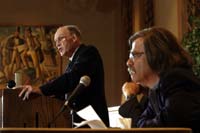 |
His widow, Marion Sondermann ’66, still frequents the lectures. “Fred put his whole heart and soul into CC and teaching and the symposium,” she says. “I’m glad he’s honored that way.”
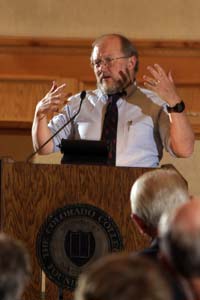 |
The Sondermann Symposium is organized by the political science department and promoted by President Richard F. Celeste as part of his action agenda. Professor Fred Sondermann taught political science at CC from 1953 to 1978, and first staged a presidential election-year symposium in 1968.
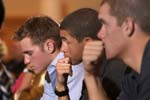 |
The Fred A. Sondermann Symposium is sponsored by the Sondermann Fund, the Robert and Janet Manning Endowed Fund for Political Science, the McHugh Leadership Endowment, the Marianne Lannon Lopat Memorial Lecture Fund, the W. Lewis Abbott Memorial Lecture Fund, the president’s office, and the dean of the faculty.
For more information, see www.ColoradoCollege.edu/news_events/ symposium.asp
The Colorado College | 14 East Cache La Poudre Street | Colo Sprgs, CO | 80903 || 719-389-6000